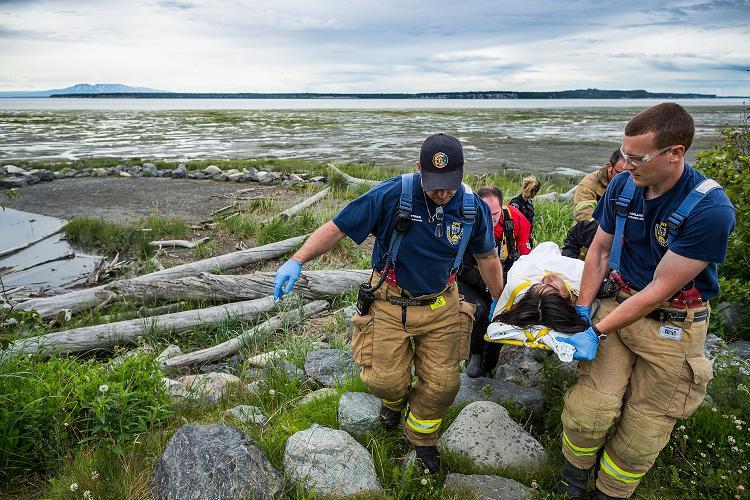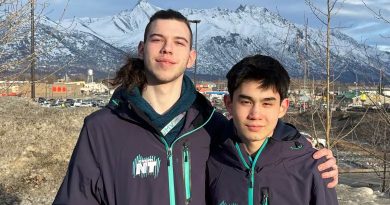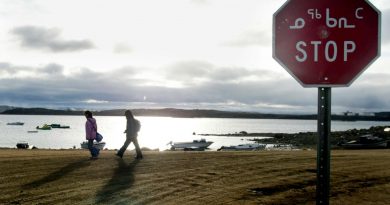Is technology enabling Alaska wilderness welfare cheats?
 As the ease of communications creeps ever deeper into the wilds of Alaska, discussions about lives risked and money spent on unnecessary rescues will only increase.
As the ease of communications creeps ever deeper into the wilds of Alaska, discussions about lives risked and money spent on unnecessary rescues will only increase.
The National Outdoor Leadership School cracked the door on this debate in 2011 when it questioned whether the very real and necessary rescue of a group of teenagers attacked and mauled by a grizzly bear east of Talkeetna had been delayed because of rescuers’ experience with false alarms in the days just prior to that July attack.
In another case, a man had called for help only 14 miles from Barrow after getting his snowmachine stuck in the mud.
Such calls are not uncommon, and they are increasing. These requests for unneeded rescue will only continue to grow barring some change in thinking. It is inevitable.
Discomfort and danger are part perception and part reality. What is but a minor hardship in the eyes of the capable and experienced can easily come to be perceived as a life-or-death matter in the eyes of the incapable and inexperienced.
And when the latter conclusion is reached these days, people turn quickly to the now ubiquitous cell phone or the increasingly common personal-locator beacon to call for help.
Two alarms, but no rescue
A hunter with problems downstream from the Denali Highway this summer set off not just one but two electronic signals demanding rescue. Hunter Mark Spencer of Anchorage was in no real danger, but he called for help because he could. It was more convenient (not to mention cheaper) than dealing with his problems himself. Alerted first by a personal locator beacon and then a high-tech wristwatch with its own locator signal, the authorities flew north more than a 100 miles from Anchorage to check first on Spencer and then on some friends he’d left camped out along the Susitna River. Finding everyone fine, the rescuers turned around and flew home.
No one in officialdom suggested Spencer be charged for sending out what amounted to a false alarm, though other states sometimes charge for unnecessary rescues. Eight states — California, Colorado, Hawaii, Idaho, Maine, Oregon, Vermont and Maine — now have laws that permit that, although most bill only in the most egregious of cases. It is generally left to a gang of bureaucrats to decide whether to send the bill.
Many in Alaska — perhaps most — would likely object to giving the state bureaucracy this additional authority and responsibility. And some in the bureaucracy, including a spokeswoman for the Alaska State Troopers, have said they don’t want the job. Troopers believe that billing for rescues might discourage someone from calling for one, and that could prove fatal.
Sadly, it is a given that people are going to die in the Alaska wilderness — whether they can easily call for rescues or not. People die in the Alaska wilderness with some regularity. The wilderness can kill you in a variety of ways, though when you get down to the cold, hard facts, it is nowhere near as efficient at killing people as civilization. The leading causes of death in the 49th state are:
• Cancer, in which a significant number of cases are linked to the use of tobacco;
• Diseases of the heart, most of which are now linked to what is politely called “the sedentary lifestyle;”
• Unintentional injuries, most of which happen in accidents involving internal-combustion engines, be they motor vehicles, boats, snowmachines, airplanes or heavy equipment.
Welfare-cheats of the wilderness
The numbers make it pretty clear that if troopers wanted to be seriously proactive about saving lives, they’d take the money they now spend on search-and-rescue operations and spend it on a program to get Alaskans to eat less, exercise more and drive better. But those kinds of programs don’t bask in the glow of life-saving heroics the way search-and-rescue does.
Simply put, it feels good and right to rescue people, and so the troopers and the National Park Service and the North Slope Borough and even individual Alaskans willingly do so. Hey, I confess I’ve joined in to help people in trouble beyond the road system, and I’d do it again. It made me feel a better person.
The problem is some people are perfectly willing to take advantage of this. They are the welfare-cheats of the wilderness. They think it is the responsibility of others to take care of them. It isn’t.
And while it might be a legitimate responsibility of government to save them from death, it is not government’s responsibility to save them from discomfort. Rescues are a benefit our society provides its citizens when their lives are in danger in the wilderness, not a service offered just because people decide they don’t like it out there. Unfortunately, it appears beyond the pale of most Alaska rescue officials to explain this to those who call for help.
Nobody says no
When it comes to rescue, nobody wants to say “no.” Why? Because everyone is afraid of the consequences if they draw that line — only to have something bad happen afterward. This is why troopers felt obligated to airlift a pair of clueless hikers from the Chugach Mountains to their car only 750 feet away at the McHugh Creek wayside this spring. The pair was cold, you know, and neither hiker had good gear, and they were so tired from hiking uphill through snow that they couldn’t turn around and slide back downhill.
Most in Alaska would agree people like this should be charged for rescue — just as most would probably agree that the last thing this state needs is another layer of bureaucracy trying to decide who should or shouldn’t pay. Luckily that isn’t necessary. There is a simple way to make people pay — and make them think twice about calling for unnecessary rescues — without sending them a bill.
Troopers should steal a page from their drunk-driving campaign. You know the campaign: “If you are driving impaired, we will find you. We will pull you over. We will… etc., etc.” Along these lines, troopers need to establish a simple, new policy for rescue:
“If you call for help, we will rescue you. We will haul your ass to the city. We will see you get medical treatment if necessary. We will debrief you. We will then leave it to you to get back to your motor vehicle or retrieve your gear. And we will most certainly cite you for littering if you don’t get your junk out of the field.”
Had those McHugh hikers been forced to think twice about struggling the 750-feet downhill to their car or paying for a cab ride back to it from trooper headquarters in Muldoon after a helo ride there, they might well have decided they didn’t need a rescue. The Denali Highway hunter and his friends quickly made this decision after discovering the rescue helicopter wouldn’t haul their gear home for them. It is only too bad the helo didn’t pull them out of there, deliver them to Anchorage and then let them figure out how to get back to retrieve all the pricey toys.
Get your stuff yourself
People might think twice about how much they really need rescue if they are first forced to think about how they are going to recover expensive equipment left behind after a rescue. Making people recover their equipment would impose a cost on rescue without billing anyone. And if it discouraged a few people from calling for help, that is a good thing.
Because in a real, life-and-death rescue here’s what happens: Rescuers come and get you, and they leave your equipment behind. After you get out of the hospital, it’s up to you to figure out how to retrieve your stuff. Why should people who summon unnecessary rescues be treated any differently? Doing so only encourage people to call for for rescues they don’t need.
And the sad thing is, we’ve had at least two people killed in this state in recent years — one a volunteer ranger on Mt. McKinley and the other a volunteer searcher in the White Mountains north of Fairbanks — helping out with rescues. Those deaths underline the glaring flaw inherent in the idea that “we don’t want to discourage anyone from calling for rescue.”
Oh yes we do, because rescues endanger rescuers. Not to mention that the whole argument that someone might not call for rescue if we discourage unnecessary calls is a bit facetious. When we you get right down to it, how many people in Alaska today are tough enough and skilled enough to gut it out and improvise a self-rescue when they are truly in serious trouble? I’d venture I know many of them, and it’s not a big group.
Contact Craig Medred at craig(at)alaskadispatch.com
For more stories from Alaska Dispatch, click here



